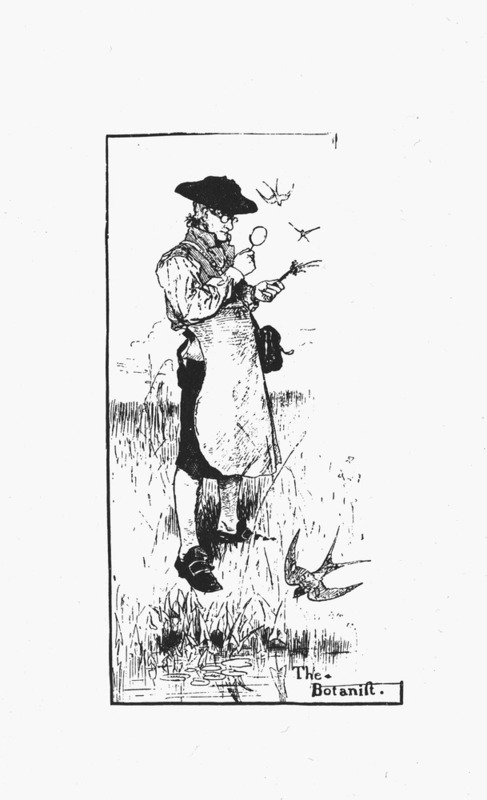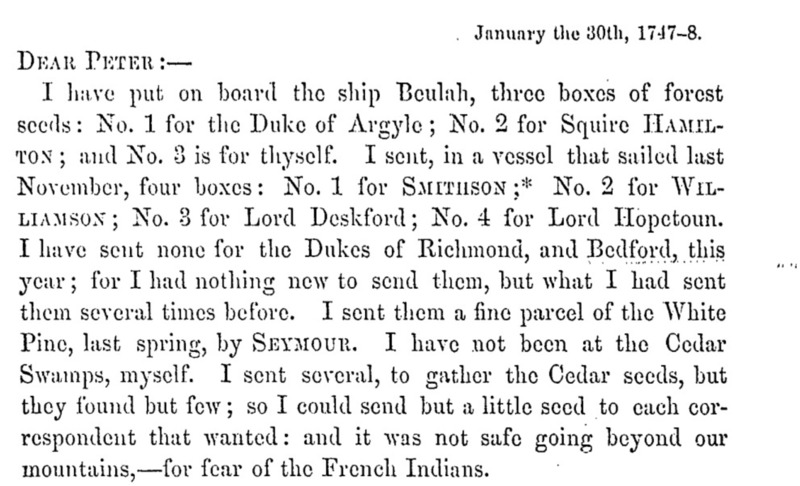From Farmer to Father of American Botany
John Bartram’s family, among other Quakers fleeing religious persecution in England, settled in William Penn’s newly acquired holdings in North America. This religious safe haven would be the birthplace of John Bartram, the earliest native American botanist. Bartram inherited a farm in Darby, Pennsylvania left by his late uncle Issac.[1] Although not formally educated, Bartram attended the county school and in his time away from the farm he studied Latin, Greek, and the classics when he could afford the literature. However, Bartram developed a striking affinity for physics and surgery. Self-taught, Bartram offered his knowledge to his poor neighbors who could not afford to travel to Philadelphia for medical treatment. Bartram practiced holistic medicine through the natural properties of plants, solidifying his appreciation and love of the botanical sciences. [2] Bartram developed a relationship with fellow Quaker and well-connected cloth merchant Peter Collinson, who also shared a love for the natural sciences. Bartram sent seeds, insects, and other specimens, and in return, Collinson would provide Bartram with advice, books, and most importantly connections to various other British collectors and American naturalists. . These connections would prove valuable to Bartram, as he curated several subscriptions from wealthy, educated gentlemen allowing Bartram to spend less time at home on the farm, and more time pursuing his passion for the botanical sciences. In 1743 Bartram, accompanied by Conrad Weiser and Lewis Evans, traveled from Pennsylvania to Fort Oswego on Lake Ontario. [3] Bartram meticulously recorded various things throughout the expedition impressing his friend Peter Collinson, who despite Bartram’s poor grammar, sponsored Bartram’s publication in Philosophical Transactions, the scientific journal of the Royal Society. Bartram traveled several more times in 1744, 1745, and 1746 durning this time he shared correspondences with likes of several prominent European botanist namely Hans Sloane, Carl Linnaeus, Peter Kalm, and Andre Michaux who all praised Bartram for his work in botany. With the support of Peter Collinson and fellow Pennsylvanian Benjamin Franklin, George III appointed John Bartram to the position of King’s Botanist of North America in 1765, this included a yearly stipend of €50. This new but meager stipended and title allowed Bartram to exhaust his full attention to his expeditions and work as a natural scientist. John Bartram founded his own personal garden at his Kingsessing farm in 1728. This small garden would grow as Bartram developed a systematic collection of specimens that he encountered on his various expeditions. Bartram's Garden is considered the oldest botanical garden in North America.
John Bartram's unique correspondce with Peter Collionson proved fruitful in maintaining a direct connection to a metropolatian center of learning thus contributing to a global spread of information. Bartram's lack of formal training was supplemented by his desire to learn and natual work ethic. As an avid of proponent of scientific engagement and procurer of new thoughts, Bartram along with Ben Franklin and several others, founded the American Philosophical Society in 1769. This learned society played a crucial role in developing a bourgeoning American intellectual culture. John Bartram's contributions to the cultivation of North American fauna can be attributed to the wide set of correspondences he maintained with his fellow scientists and friends.
[1]Darlington, William, and Peter Collinson. Memorials of John Bartram and Humphry Marshall: with notices of their botanical contemporaries. Philadelphia: Lindsay & Blakiston, 1849. Sabin Americana: History of the Americas, 1500-1926; Accessed 14 Jul. 2020. https://link.gale.com/apps/doc/CY0101900214/SABN?u=viva_gmu&sid=SABN&xid=42c97a25
[2] Ibid, pg. 39-40
[3] Egerton, Frank N. "Bartram, John (1699–1777), botanist and explorer in America." Oxford Dictionary of National Biography. 23 Sep. 2004; Accessed 15 Jul. 2020. https://www-oxforddnb-com.mutex.gmu.edu/view/10.1093/ref:odnb/9780198614128.001.0001/odnb-9780198614128-e-68442.

